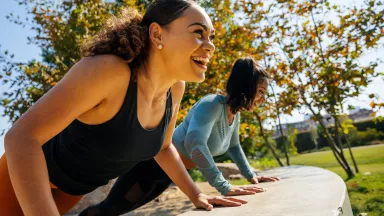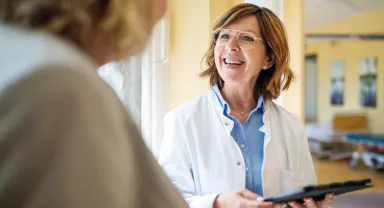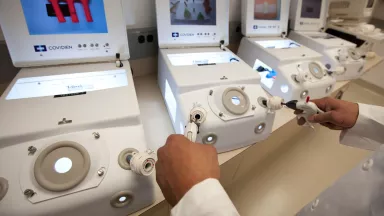Introduction
Our world-renowned orthopedic surgeons and orthopedists are experts in their fields with specialized training to provide the optimal diagnosis and treatment for a range of orthopedic conditions. We are internationally recognized for delivering the highest-quality orthopedic care to our patients.
What is arthritis of the hip & knee?
Arthritis, also known as osteoarthritis, is a disease of the joint, which is the place where two bones connect. Healthy joints help the body move, bend and twist. Knees glide up and down stairs without creaking or crunching. Hips move you along on a walk without complaint. But when you have arthritis, such simple, everyday movements can hurt. Climbing stairs can be painful. Walking a few steps, opening a door and even combing your hair can be hard.
Arthritis typically impacts joints in the spine, hip, hand, knee and foot, but it can happen in other joints too.
Arthritis is most common in older people. Even though you can’t cure arthritis, there are many treatments that can help with pain and make it easier to move. And actions can be taken to keep the damage from getting worse.
What are the symptoms?
Symptoms of arthritis may include:
- Pain, which may feel burning or sharp
- Aching joints
- Stiffness or a creaky feeling in the joints, particularly in the morning or after resting
- Muscle weakness around the joints, which is particularly common with arthritis in the knee
- Deformed joints, or joints that look oddly shaped, especially as arthritis gets worse
- Reduced range of motion and loss of function as arthritis gets worse, making it potentially difficult to fully bend, flex or extend joints or even use them at all
- Cracking, creaking or crunching sounds at the joint
How is arthritis diagnosed?
Your doctor will check that your pain is not caused by another problem and ask questions about your symptoms, such as:
- Is the pain burning, aching or sharp?
- Are your joints stiff in the morning? If yes, how long does the stiffness last?
- Do you have any joint swelling?
If joints are tender and swollen and the muscles around them are weak, this will further help your doctor confirm a possible arthritis diagnosis. X-rays can be used to check joints for damage. Your doctor may want to do blood tests or other tests to see if there are other causes for your pain.
How is it treated?
There are many treatments for arthritis, but what works for someone else may not help you. Work with your doctor to find the best solution. Often a combination of treatments can help most. These may include:
- Pain medicine: If your pain is mild, over-the-counter pain medicines such as acetaminophen and nonsteroidal anti-inflammatory drugs (NSAIDs) may help. Commonly used NSAIDs include ibuprofen and naproxen. But if these don’t alleviate pain, you may need a stronger prescription medicine. Having shots of medicine in the joint also helps some people.
- Heat or ice on the painful joint: Heat may help you loosen up before an activity. Ice is a good pain reliever after activity or exercise. Your doctor may prescribe gels or creams to rub on the joint for pain relief.
- Weight loss, if overweight: Losing weight can help relieve arthritic pain, as that takes some of the stress off joints.
- Strength exercise: Having stronger thigh muscles, for example, can help reduce stress on the knees. Swimming, biking and walking are good strength-training activities. Talk to your doctor about what kind of activity is best for you, or get advice from a physical therapist.
- Surgery: If hip or knee pain does not improve with treatment, a doctor may suggest surgery to replace the joint.
Additional devices and tools can help relieve arthritic symptoms by taking the stress and weight off joints and making it easier to hold objects, open and close things and walk. Doorknob covers, tape, braces, splints and canes may help.
Changing your activities or the way you perform tasks to reduce the stress on joints can also increase mobility and range of motion. For example, try walking instead of jogging. Or use a sewing machine to make a quilt instead of making it by hand.
Physician Referrals
Montefiore Einstein embraces a collaborative approach.
If you have a patient who could benefit from our services, please reach out.
718-920-2060
Schedule a Visit
Have a general question or concern?
We’re available to help you by phone or email.
• 718-920-2060 • orthofeedback@montefiore.org






